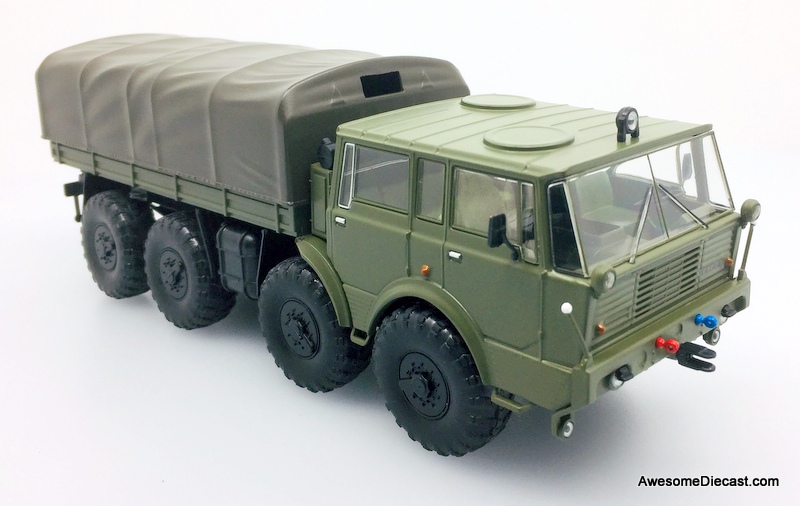IXO Models
IXO 1:43 Tatra 813 6x6 Pick-Up Truck, Orange/White
This model comes mounted on a base and displayed in an acrylic show case

The Tatra T813 was a truck produced in Czechoslovakia by the Tatra company. It was produced from 1967 to 1982. The basic representative of this series was a military version of the 8×8 Kolos (Colossus), which was able to pull trailers up to a total weight of 100 tons. Tatra also produced a civilian version in either 6×6 or 4×4. After fifteen years of production, 11,751 vehicles were built in all modifications. Many units were exported to the USSR, East Germany, Romania and India.
The prototype, made of Tatra 138 parts, was built in 1960. It had permanent 4 × 4 all-wheel-drive. After trials, the designers decided to develop and expand the concept to an 8x8 all-wheel-drive all-terrain vehicle. The basis of the design became the modular chassis of the Tatra 813. In 1983, it was succeeded by the Tatra T815.
A tubular backbone construction was chosen for the T813. The advantages of the central load carrying backbone tube are the high torsional and bending stiffness protecting the truck's body from forces caused by the payload, plus it houses all important parts of the drivetrain and allows the modular construction so designers and customers can choose between two-, three-, and four-axle versions and wheelbase combinations. The T-813 design uses a cab-over-engine configuration, wide-profile super-single tires, and central tire inflation/deflation system.
The naturally aspirated V12 engine T-930 was created by adding four cylinders to the existing T-928 75° V8 engine of the Tatra T138 series. The crankshaft uses six individual journals bolted together with front and rear pins running on the main roller bearings on the axial friction thrust washers. The military version was multi-fuel capable, running on any mixture of diesel fuel, petrol/gasoline, and kerosene aviation fuel.
T-813 uses a full-length backbone tube with modular independent-swinging half-axles available as either 4×4, 6×6, or 8×8. 4×4 models had a front axle suspension system with adjustable torsion bars, 6×6 and 8×8 models front and rear axles had longitudinal semi-elliptic leaf springs. 4×4 rear axle has air suspension. Permanent all-wheel-drive, front twin steer (6×6, 8×8) drive via homo-kinetic drive shafts, lockable differentials, inter-axle differentials with locks, and planetary hub reductions are standard for all models. 6×6 and 8x8 versions use twin-steering front-axles and a single rear-axle.
The main gearbox is behind the cabin and connected to the engine clutch housing via a short cardan shaft (this design enables a 'flat-floor' cabin.) The main gearbox bolts to an auxiliary gearbox, to a transfer case, then to a backbone tube, and forms the main part of the chassis structure. A rear power take off and a winch drive were optional. Main and auxiliary gears are synchronized except first and reverse gear. The new feature was a unique 2-speed planetary overdrive system bolted between the front and rear axles. The overdrive could only be selected manually while the vehicle is stationary. The auxiliary gearbox has a neutral position so the winch and a power take-off use the main gearbox gearing for variable speed operation. From the backbone tube, torque flows to the wheels via Tatra gear differentials with differential locks, offset half-shafts, and planetary hub-reductions.